May 21, 2025 | 07:48 GMT +7
May 21, 2025 | 07:48 GMT +7
Hotline: 0913.378.918
May 21, 2025 | 07:48 GMT +7
Hotline: 0913.378.918

Many diseases on livestock and poultry in the first half of 2021 have been well controlled. Photo: TL.
According to a report of the Animal Health Department, in the first 6 months of 2021, the vast majority of poultry are safe from avian influenza, cattle are safe from Foot and Mouth Disease (FMD) and African swine fever (ASF), especially there is no Blue ear epidemic (PRRS) in the localities. Lumpy skin disease (LSD) on cattle has just recently discovered in Vietnam at the beginning of October 2020 but so far it has basically been under control.
Regarding the aquatic diseases’ prevention and control activities, in the first 6 months of 2021, the total damaged aquaculture area was about 11,390 ha, down 67.6% over the same period in 2020.
As reported by Animal Health Department, in the first 6 months of 2021, epidemics have occurred in 76 communes in 53 districts of 25 provinces and cities. The total number of infected, dead and destroyed poultry was 313,729. Compared to the same period in 2020, the number of outbreaks increased by 1.33 times, the number of culled poultry increased by 1.70 times. Currently, the whole country has had 4 outbreaks in less than 21 days.
Avian influenza outbreaks mainly occur in small poultry households which have not been vaccinated. The localities have detected and timely handled it to prevent widespread. Influenza A/H5N6 viruses circulate in the North and Central regions while Influenza A/H5N1 viruses concentrate mainly in the southern provinces. The geographical distribution of avian influenza virus strains in 2021 is similar to that of 2020.
Warning from the Animal Health Department: Recently, the Influenza A/H5N8 virus has first been detected in outbreaks in Cao Bang and Hoa Binh provinces.
In the coming time, the risk of highly pathogenic influenza diseases A/H5N1, A/H5N6 and A/H5N8 spreading and increasing is very high. In addition, there is a risk of some avian influenza virus strains (A/H7N9, A/H5N2,...) infecting Vietnam through transportation, trading and consumption of poultry and poultry products that are illegally imported, of unknown origin, especially for the northern border provinces and other provinces and cities that consume smuggled poultry and poultry products.
In the first 6 months of the year, ASF has occurred in 1,152 communes in 225 districts of 45 provinces and cities. The total number of pigs destroyed was 62,188, mainly in small households because biosafety breeding conditions could not be ensured. Currently, the whole country has had 412 outbreaks in 113 districts of 29 provinces and cities in less than 21 days.
In the coming time, the Animal Health Department assesses that the risk of ASF outbreaks recurring and arising is very high as the weather continues to have many extreme developments, reducing livestock’s resistance, while trade and transport of livestock and livestock products have increased. There has not yet any drug and vaccine for this disease.
In addition, the ASF virus has a very high resistance, can survive for a long time in the environment. The transmission route of the disease is very diverse, complicated and difficult to control. Many localities are initiating pig re-herding, using cattle breeds of unknown origin…
LSD on buffaloes and cows is a new disease discovered in Vietnam in early October 2021. Since the beginning of the year, LSD has occurred in 2,781 communes in 285 districts of 37 provinces and cities. The total number of infected buffaloes and cows was 89,871, the number of buffaloes and cows destroyed was 13,168.
LSD has the high risk to continue spreading fast and on a large scale due to some reasons such as diverse, complex, difficult-to-control transmission routes, especially through disease vectors (flies, mosquitoes, ticks, gulls sucking blood, transmitting diseases...); grazing buffaloes and cows in common fields and grazing grounds is still quite common... Furthermore, the demand for transporting and slaughtering buffaloes and cows has increased sharply; The weather continues to have many extreme changes (scorching sun, rain, storm, flood...), reducing the resistance of livestock, causing environmental pollution…
In regard to aquaculture, shrimp diseases are mainly white spot syndrome (WSSV) and acute hepatopancreatic necrosis disease (AHPND/ EMS); Enterocytozoon Hepatopenaei disease (EHP) appeared in some localities. Compared to the same period in 2020, WSSV occurred in a narrower range of 30.5% and the affected shrimp area decreased by 45.2%. EMS occurred in a wider range of 0.8%, but the infected shrimp area decreased by 37.8%. EHP disease has shown signs of more frequent appearance, even in Ninh Thuan shrimp seed areas, where exist the risk of EHP spreading through the transportation of shrimp seed without quarantine.
The risk that the disease will continue to circulate, spread and cause damage to shrimp farmers in the near future is very high if proactive measures are not taken to control the disease, especially in terms of seed and preparation for cultivation pond.
At present, climate change and weather continue to have complicated developments, with prolonged heat, saltwater intrusion, rain and flood... changing the environment and adversely affecting aquatic health, creating favorable conditions for pathogens to develop and cause disease in aquatic animals.

The cleaning, disinfecting, and building of disease-free areas and facilities continue to have a change in the first 6 months of 2021. Photo: TL.

(VAN) In 2024, over 295 million people across 53 countries and territories faced acute hunger—an increase of almost 14 million people compared to 2023, while the number of people facing catastrophic levels of hunger reached a record high.

(VAN) World Environment Day 2025 (June 5) carries the theme 'Beat Plastic Pollution' continuing to emphasize the global urgency of addressing the plastic waste crisis.

(VAN) This was the assessment shared by experts at the workshop titled 'Assessing the Role and Potential of Low-Emission Rice Production Systems in Vietnam,' held on the morning of May 19.

(VAN) Cai Rong Port is the fisheries control center of Quang Ninh, helping to monitor fishing vessels, combat IUU fishing, and remove the EC's 'yellow card'.

(VAN) The German Agricultural Society (DLG) explores the possibility of establishing a mechanization service center in Vietnam’s Mekong Delta to support farmers in accessing and utilizing advanced machinery.

(VAN) On May 16, the Department of Water Resources Management, in collaboration with the Food and Agriculture Organization of the United Nations (FAO), held a signing ceremony for the GEF-8 project document.

(VAN) Food safety, mechanization, vocational training, and market opening are key areas of cooperation expected between the Vietnamese Government and the Federal Republic of Germany.